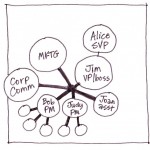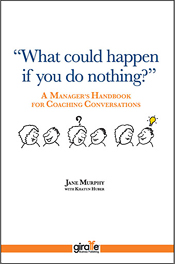Coaching New Leaders Part 2: Stakeholders
 Jerry Murphy is guest blogger of a series of six posts focused on coaching new leaders. The series will run consecutively.
Jerry Murphy is guest blogger of a series of six posts focused on coaching new leaders. The series will run consecutively.
Read about Jerry below.
One of a manager’s most challenging and rewarding situations is working with someone who is becoming a manager herself—either a first-time manager or taking on a new leadership position.
In this series of posts, I identify opportunities for you to use a coaching orientation to help you facilitate this transition for any of your people. This will help you to frame powerful questions, calibrating your “listening radar” for common issues, and offer appropriate suggestions for their consideration.
The new manager you are coaching has started her new job. She has also developed her stakeholder map (see part 1 of this series: Showing Up Isn’t 80% of Success). Now it’s time for her to solidify her team and work out and up in the organization to strengthen her network.
Here are some more themes to listen for (and maybe ideas to suggest) as you’re coaching your transitioning leader:
Spend time with your team.
- Their primary questions will be, “Who are you?” and “Can I work with you?” She will need to demonstrate who she is as an individual leader, and that she values them and will give them the best opportunity to grow in their jobs. Spending quality time with them as a group and individually, asking good questions and listening carefully, is the best way.
- If she was promoted from within, it’s likely that one or more of her teammates were also competing for her job. They are important stakeholders, too. She may have some fences to mend.
Build your network out and up
- She should start with her boss (who may be you yourself). Then her boss’s peers. Then their bosses. She should add them to her stakeholder map. Where are the sources of power and influence in the organization? Whose reputation may depend on her performance? And vice versa? She can ask the same questions as she asked her team (see part 1: Showing Up Isn’t 80% of Success).
- The definition of a stakeholder is someone who can influence her success or failure. Where are the most productive interdependencies? What can she do for them? What can they do for her? Are there any political “banana peels” out there…who might be gunning for her or her boss?
- Where are the other relevant stakeholders? There may be younger people she can mentor, other teams or departments she may need to influence, or people from outside the organization such as customers or consultants.
Your coachee’s stakeholder map may be looking very complex by now. Encourage her to keep updating the map to track her developing network and influence.
What advice can you add regarding reaching out to stakeholders as one steps up in her new position? (Add your response below.)
If you found this post helpful, check out “About the Book” on this blog, and order yourself a copy of “What could happen if you do nothing?” A manager’s handbook for coaching conversations.
 Jerry Murphy is president of Giraffe LLC, a New York-based consulting practice, and Giraffe Business Publishing, a multimedia publishing venture. He serves an international client group of business leaders, teams, and organizations in improving their performance through coaching, leadership development programs, and organizational learning and development.
Jerry Murphy is president of Giraffe LLC, a New York-based consulting practice, and Giraffe Business Publishing, a multimedia publishing venture. He serves an international client group of business leaders, teams, and organizations in improving their performance through coaching, leadership development programs, and organizational learning and development.








